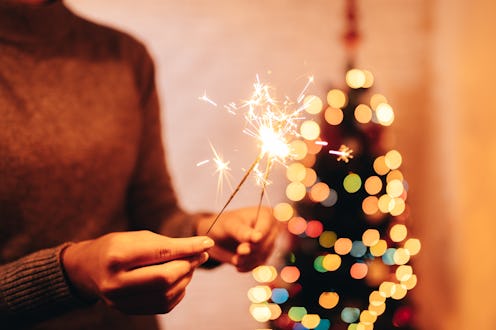Holidays
Here’s How Doctors Recommend Safely Celebrating New Year’s Eve
“Ditch ‘Auld Lang Syne’ this year.”

Typically, the end of the year is a chance to kick back and enjoy a less stressful holiday gathering with friends and family, to say goodbye to the previous year and ring in the next. Though many people can’t wait to say good riddance to 2020, New Year’s Eve will likely look very different during the COVID-19 pandemic.
“The pandemic has been very stressful and has caused isolation for many people and the holiday season only creates and adds challenges to this,” says Dr. Soma Mandal, MD, a board-certified internist at Summit Medical Group in Berkeley Heights, New Jersey. Still, Dr. Mandal and other experts stress that you can still pop the bubbly while keeping yourself and others safe. It only takes a little creativity to safely celebrate New Year’s Eve this year.
According to Dr. Mandal, it’s as important as ever to follow the basic COVID-19 guidelines: wearing a mask anytime you’re not inside your house, regularly washing your hands, and maintaining a distance of at least 6 feet from others during prolonged contact, which the Centers for Disease Control & Prevention (CDC) defines as 15 minutes or more during a 24-hour period. This applies at all times, but especially if you come into contact with anyone you don’t live with.
What's The Safest Way To Celebrate New Year's Eve During The Pandemic?
As far as parties go, the CDC is pretty clear in its stance against holiday fêtes: "Gatherings with family and friends who do not live with you can increase the chances of getting or spreading COVID-19 or the flu," the Centers write. Medical experts strongly advised against large family gatherings for Thanksgiving and the holiday season, but millions of Americans traveled anyway. The U.S. is now seeing the continuation of a fall surge of infections, which experts say doesn’t yet take the holiday’s effects into account. This further highlights the importance of avoiding throwing a big party to ring in the new year.
If your family tradition is to gather for New Year's Eve, remember that just because something's tradition doesn't mean it's safe. “Keep in mind that even though you may be visiting family, you are considered to be in different cohorts or households and your exposures are different,” adds Dr. Eudene Harry, MD, a board-certified emergency medicine physician in Orlando, Florida. “You are potentially bringing your community with you when you travel. If you have been exposed to someone diagnosed with COVID-19, please stay at home.”
“When planning for the New Year's Eve this year, it is important to assess your risk and your loved ones' risks as well,” Dr. Mandal says. “If the rates of infection are high in your area, and you or family members have other risk factors (such as health conditions), celebrating virtually obviously has the lowest risk of infection.”
How To Manage COVID-19 Risk Over New Year's Eve
Per CDC guidelines, the safest option for celebrating is to stay home with just the people you live with or celebrate virtually with others, especially if you’re in an area with a stay-at-home order, such as California. If you decide to still celebrate in-person, a small gathering outside where everyone is masked is the next best choice, though this could prove to be challenging in many parts of the U.S. because of cold winter weather, Dr. Mandal says.
“[CDC guidelines state that] indoor gatherings are riskier than outdoor ones, large groups are riskier than small groups and prolonged contact is riskier than brief contact,” she says. “How many people can [safely] gather varies from state to state, but Dr. Anthony Fauci recently stated that small gatherings are driving current COVID-19 outbreaks.”
If you still decide to gather with others, experts recommend taking precautions to keep everyone safe. Dr. Mandal suggests sending invitations with guidelines for maintaining distance, wearing masks, and washing hands; keeping hand sanitizer readily available for guests; and serving pre-packaged food and drinks in lieu of communal bottles and serving dishes. Provide outdoor furniture to promote social distancing, she adds, have a fire pit or outdoor heaters to keep guests warm, and avoid shouting or singing. “Ditch 'Auld Lang Syne' this year,” Dr. Mandal says.
Dr. Mandal also says to avoid inviting anyone who would have to travel, and instead extend a virtual invitation. This goes double for anyone who'd be traveling via public transit, says Dr. Harry, rather than via car — which itself is risky on New Year's Eve due to potential drunk driving accidents.
Ultimately, there's nothing wrong with staying home this year, especially with FOMO levels at an all-time low.
Experts:
Soma Mandal, MD, a board-certified internist at Summit Medical Group in Berkeley Heights, New Jersey
Eudene Harry, MD, a board-certified emergency medicine physician in Orlando, Florida
This article was originally published on